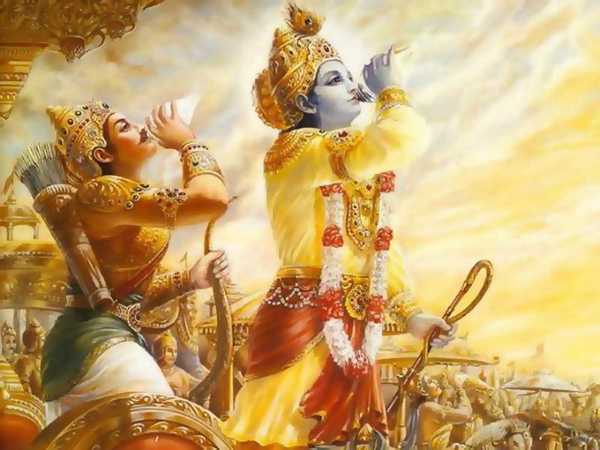Chapter 61

“Vrihadaswa said, ‘After Varshneya had gone away, Pushkara won from therighteous Nala that latter’s kingdom and what else of wealth he had. Andunto Nala, O king, who had lost his kingdom, Pushkara laughingly said,’Let the play go on. But what stake hast thou now? Damayanti onlyremaineth; all else of thine hath been won by me. Well, if thou likest,that Damayanti be our stake now.’ Hearing these words of Pushkara thevirtuous king felt as if his heart would burst in rage, but he spake nota word. And gazing at Pushkara in anguish, king Nala of great fame tookall the ornaments off every part of his body. And attired in a singlepiece of cloth, his body uncovered, renouncing all his wealth, andenhancing the grief of friends, the king set out. And Damayanti, clad inone piece of cloth, followed him behind as he was leaving the city. Andcoming to the outskirts of the city, Nala stayed there for three nightswith his wife. But Pushkara, O king, proclaimed through the city that hethat should show any attention to Nala, would be doomed to death. And onaccount of these words of Pushkara and knowing his malice towards Nala,the citizens, O Yudhishthira, no longer showed him hospitable regards.And unregarded though deserving of hospitable regards, Nala passed threenights in the outskirts of the city, living on water alone. And afflictedwith hunger, the king went away in search of fruit and roots, Damayantifollowing him behind. And in agony of famine, after many days, Nala sawsome birds with plumage of golden hue. And thereupon the mighty lord ofthe Nishadhas thought within himself, ‘These will be my banquet today andalso my wealth.’ And then he covered them with the cloth he had on–whenbearing up that garment of his, the birds rose up to the sky. Andbeholding Nala nude and melancholy, and standing with face turned towardsthe ground, those rangers of the sky addressed him, saying, ‘O thou ofsmall sense, we are even those dice. We had come hither wishing to takeaway thy cloth, for it pleased us not that thou shouldst depart even withthy cloth on.’ And finding himself deprived of his attire, and knowingalso that the dice were departing (with it), the virtuous Nala, O king,thus spake unto Damayanti, ‘O faultless one, they through whose anger Ihave been despoiled of my kingdom, they through whose influencedistressed and afflicted with hunger, I am unable to procure sustenance,they for whom the Nishadhas offered me not any hospitality, they, O timidone, are carrying off my cloth, assuming the form of birds. Fallen intothis dire disaster, I am afflicted with grief and deprived of my senses,I am thy lord, do thou, therefore, listen to the words I speak for thygood. These many roads lead to the southern country, passing by (the cityof) Avanti and the Rikshavat mountains. This is that mighty mountaincalled Vindhya; yon, the river Payasvini running sea-wards, and yonderare the asylums of the ascetics, furnished with various fruit and roots.This road leadeth to the country of the Vidarbhas–and that, to thecountry of the Kosalas. Beyond these roads to the south is the southerncountry.’ Addressing Bhima’s daughter, O Bharata, he distressed king Nalaspake those words unto Damayanti over and over again. Thereupon afflictedwith grief, in a voice choked with tears, Damayanti spake unto Naishadhathese piteous words, ‘O king, thinking of thy purpose, my hearttrembleth, and all my limbs become faint. How can I go, leaving thee inthe lone woods despoiled of thy kingdom and deprived of thy wealth,thyself without a garment on, and worn with hunger and toil? When in thedeep woods, fatigued and afflicted with hunger, thou thinkest of thyformer bliss, I will, O great monarch, soothe thy weariness. In everysorrow there is no physic equal unto the wife, say the physicians. It isthe truth, O Nala, that I speak unto thee.’ Hearing those words of hisqueen, Nala replied, ‘O slender-waisted Damayanti, it is even as thouhast said. To a man in distress, there is no friend or medicine that isequal unto a wife. But I do not seek to renounce thee, wherefore, O timidone, dost thou dread this? O faultless one, I can forsake myself but theeI cannot forsake.’ Damayanti then said, ‘If thou dost not, O mighty king,intend to forsake me, why then dost thou point out to me the way to thecountry of the Vidarbhas? I know, O king, that thou wouldst not desertme. But, O lord of the earth, considering that thy mind is distracted,thou mayst desert me. O best of men, thou repeatedly pointest out to methe way and it is by this, O god-like one, that thou enhancest my grief.If it is thy intention that I should go to my relatives, then if itpleaseth thee, both of us will wend to the country of the Vidarbhas. Ogiver of honours, there the king of the Vidarbhas will receive thee withrespect. And honoured by him, O king, thou shall live happily in ourhome.'”




